
Georgette Heyer was an English novelist and short-story writer, in both the Regency romance and detective fiction genres. Her writing career began in 1921, when she turned a story conceived for her ailing younger brother into the novel The Black Moth. In 1925 Heyer married George Ronald Rougier, a mining engineer. The couple spent several years living in Tanganyika Territory and Macedonia before returning to England in 1929. After her novel These Old Shades became popular despite its release during the General Strike, Heyer determined that publicity was not necessary for good sales. For the rest of her life she refused to grant interviews, telling a friend: "My private life concerns no one but myself and my family."
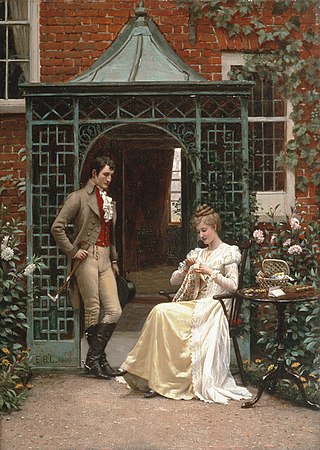
Regency romances are a subgenre of romance novels set during the period of the British Regency (1811–1820) or early 19th century. Rather than simply being versions of contemporary romance stories transported to a historical setting, Regency romances are a distinct genre with their own plot and stylistic conventions. These derive not so much from the 19th-century contemporary works of Jane Austen, but rather from Georgette Heyer, who wrote over two dozen novels set in the Regency starting in 1935 until her death in 1974, and from the fiction genre known as the novel of manners. In particular, the more traditional Regencies feature a great deal of intelligent, fast-paced dialogue between the protagonists and very little explicit sex or discussion of sex.

These Old Shades is a 1926 historical romance written by British novelist Georgette Heyer. The novel is set around 1755: Heyer refers to the Duke of Avon's participation in the 1745 uprising as ten years previous; in addition the Prince of Condé is said to be about 20 years old. However, she also refers to Madame de Pompadour as actively involved with Louis XV, whereas her relationship with the King ended at about 1750.

Devil's Cub is a Georgian romance novel written by Georgette Heyer. Set in 1780, it is the sequel to These Old Shades (1926). The book was published in 1932, and has not been out of print since. It is one of Heyer's most popular novels.

Regency Buck is a novel written by Georgette Heyer. It has three distinctions: it is the first of her novels to deal with the Regency period; it is one of only a few to combine both genres for which she was noted, the Regency romance and the mystery novel; and it is the only one of her Regency stories to feature Beau Brummell as an actual character, rather than as someone merely mentioned in passing. The story is set in 1811–1812.
The Regency era in the United Kingdom is the period between 1811 and 1820, when King George III was deemed unfit to rule and his son, later George IV, was instated to be his proxy as prince regent. It was a decade of particular manners and fashions and overlaps with the Napoleonic period in Europe.
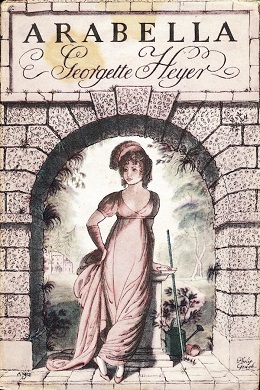
Arabella is a Regency romance novel written by Georgette Heyer. It records the plight of a relatively poor girl from the English gentry who captures the attention of a very wealthy man by claiming to be an heiress; although he disbelieves her, he is amused by her presumption and character. The story is set in the spring of 1817.
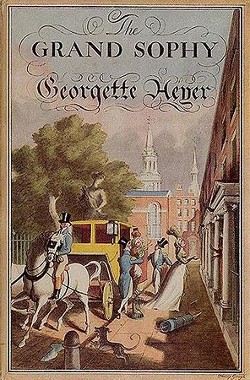
The Grand Sophy is a Regency romance novel by Georgette Heyer. It was first published in 1950 by Heinemann in the UK and Putnam in the U.S. Sales were brisk. Heinemann reported that in Australia it sold forty thousand copies in its first five months. There was also a Book Club edition in 1951.
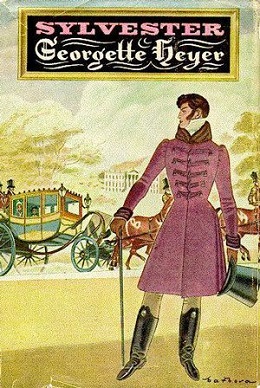
Sylvester, or the Wicked Uncle is a Regency romance novel by Georgette Heyer. First published by Heinemann, London and Putnam, New York in 1957, it is the story of intelligent and desperate Phoebe who ends up marrying the man she has run away from home to avoid, and whom she has caricatured as the villain in her novel. The book features gentle mockery of the Gothic novel genre and also features Heyer's characteristic strong heroine, with a desire for independence, who marries on her own terms. The story is set in 1817-1818.

Bath Tangle is a Regency romance novel by Georgette Heyer. The story is set in 1816.

The Toll-Gate is a Regency novel by Georgette Heyer, which takes place in 1817. Unlike many of Heyer's historical novels which concentrate on a plucky heroine, this one follows the adventures of a male main character, an ex-captain in the British Army who has returned from the Peninsular War and finds life as a civilian rather dull. The setting for this detective/romance story is in and around a Toll-Gate in the Peak District, vastly different from the elegant backgrounds of London, Bath, Brighton, or some stately home, which characterize most of Heyer's Regency novels.

April Lady is a Regency romance by Georgette Heyer, published in 1957 by Heinemann in the UK and by Putnam in the US. Previously serialised in the Woman's Journal as “My Lady Cardross”, the new novel was Heyer’s forty-fourth book and her fifteenth Regency novel.

The Black Moth (1921) is a Georgian era romance novel by the British author Georgette Heyer, set around 1751. The Black Moth was Heyer's debut novel, published when Heyer was nineteen. It was a commercial success.

The Reluctant Widow is a 1946 Regency romance by Georgette Heyer, published by Heinemann in the UK, and by Putnam the following year in the US. A humorous parody of a Gothic novel, it is set in early 1813. It was published with the description "By midnight she is a bride, by dawn a widow", and with gouache artwork by Philip Gough.

Lady of Quality is the final Regency romance written by Georgette Heyer. Published in the UK by The Bodley Head in 1972, and by E. P. Dutton in the U. S., it was the last of her novels to be published during her lifetime.

False Colours is a Regency romance by Georgette Heyer, published in 1963 in the UK by The Bodley Head and in 1964 by E. P. Dutton in the US. The novel is set in 1817, and concerns a young man who must temporarily impersonate his missing twin brother and the complications brought in the wake of this deceit. In British English, the term 'under false colours' refers to the use of a flag to which one is not entitled as a tactic for purposes of deception, and so by extension to any dishonest manoeuver.
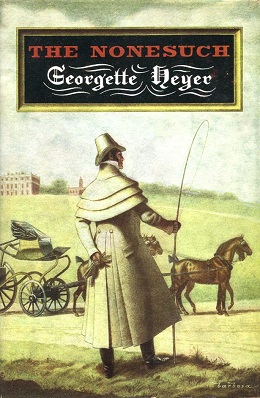
The Nonesuch is a Regency romance novel by Georgette Heyer. The story is set in 1816/1817.

A Civil Contract is a Regency era novel by Georgette Heyer, first published in October 1961 by Heinemann in the UK and in January 1962 by G. P. Putnam's Sons in the US. Set between 1814–1815, the story centres on a bankrupted viscount who reluctantly enters a marriage of convenience with a wealthy merchant's daughter. In this case the time is supported by a rich assortment of period detail.

Charity Girl is a Regency romance novel by Georgette Heyer, first published in 1970.


















